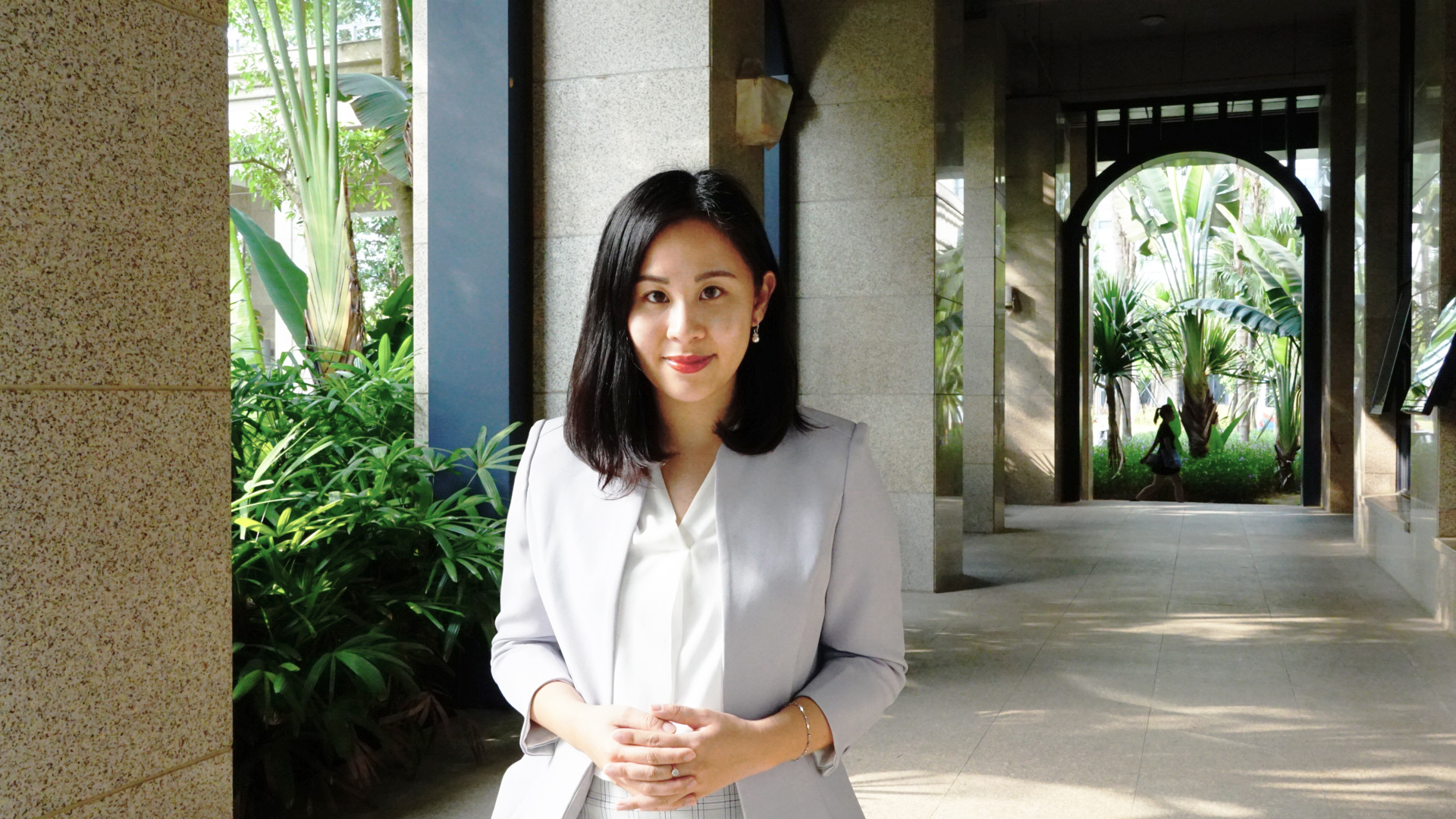HOME.
BACK.
From communication student to TVB journalist
 "As long as I have made 100% effort, luck will be with me," said Lydia Chi, a Macao correspondent for Television Broadcasts Limited (TVB) in Hong Kong. She graduated from the University of Macao (UM) in 2016 majoring in communication. This is a principle she has believed since her childhood. For her, nothing is impossible, once she sets her goal, she would put all her effort into it.
"As long as I have made 100% effort, luck will be with me," said Lydia Chi, a Macao correspondent for Television Broadcasts Limited (TVB) in Hong Kong. She graduated from the University of Macao (UM) in 2016 majoring in communication. This is a principle she has believed since her childhood. For her, nothing is impossible, once she sets her goal, she would put all her effort into it.
Becoming a reporter: To be or not to be
When she was in UM, she participated in editing a campus magazine Umac Bridges with the theme of "Art of Happiness", which won several awards including the first prize in Overall Design, the first prize in News Page Design with her story entitled "Treeplets" in China Daily (Hong Kong) Campus Newspaper Awards 2017. Lydia is a person who exerts the utmost strength in every work, as long as she perceives it to be useful for her profile or she has an interest in it. For example, she did not major in journalism, but she has done so well in this field working for TVB, the most popular TV in Hong Kong and Macao.
When Lydia was choosing her future career, many of her friends suggested her to be a reporter, as she had the ability and personality of a journalist - energetic, sociable and adventurous. But being a reporter was not her ideal job, and she didn't even think of being a reporter at that time. However, after she worked in TDM, a local media for a while, she made up her mind to become a reporter.
Covering Typhoon Hato: To go or not to go
To excel in journalism is not easy. It requires a great deal of efforts. Lydia gained experience by chances and by her determination.
When Typhoon Hato hit Macao in 2017, Lydia (working in TDM) received a live broadcast task. Lydia said, "When I was going to leave home for live broadcast, my mother stopped me, she said she would give me money to study instead of working in such a terrifying situation. If the company wanted to dismiss me then just dismiss!" That was the first time she realized that this was the choice and risk a journalist had to face. But still, she completed the live broadcast in the situation when the city was swept by the worst Typhoon in 60 years and a flood killing 10 people.
Typhoon Hato caused great damage to Macao, many regional and international media crews flocked to Macao. Since then, some of the overseas media like TVB in Hong Kong planned to hire a correspondent to report major events in Macao.
Working for TVB: Practice makes perfect
After working in TDM for three months, understanding the fundamentals of reporting, Lydia wanted to move forward. She would like to seize the opportunity to work for TVB. For her, entering TVB was another challenge, but challenges always motivated her.
However, entering TVB was not an easy task. The competition between applicants was fierce. TVB, originally launched in 1967, is the oldest and largest broadcast TV service in Hong Kong. Its main business includes free TV broadcasting, program productions, digital media trade and book distribution. It is known for its vast array of artist resources and employs more than 4,300 employees and artists worldwide. There is a saying to describe the popularity of TVB, "Wherever there is a Chinese, there is a TVB program." But this reputation did not scare Lydia off, instead, she grew optimistic and confident to get in.
She tried her best to be well-prepared. Before the interview, she photocopied all the manuscripts accumulated when she worked in TDM, and also brought a video she edited about Typhoon Hato to show her ability and experience. "Bringing a pile of paper documents for an interview can have the effect of scaring the interviewees sitting next to you," said Lydia, showing the thickness of the materials to us with a big smile. In the end, she got the job, becoming the only correspondent that TVB hired in Macao.
brought a video she edited about Typhoon Hato to show her ability and experience. "Bringing a pile of paper documents for an interview can have the effect of scaring the interviewees sitting next to you," said Lydia, showing the thickness of the materials to us with a big smile. In the end, she got the job, becoming the only correspondent that TVB hired in Macao.
In order to be a qualified reporter, it is not enough only to have the skill of interviewing, writing, editing, commenting and filming, but more importantly, a quick and accurate on-the-spot response and fluent verbal ability are crucial.
Before she entered TVB, Lydia had already worked very hard on the pronunciation of words. Every day she pushed herself to read five news stories and analyzed her pronunciation word by word against the pronunciation of senior anchors from television. Every word, every punctuation, and even every tiny pause and breath were carefully studied and repeatedly practiced. With day-to-day practice, she improved her proficiency in broadcast.
In April 2018, Lydia went to Beijing as a TVB reporter to cover news events of the National People's Congress and Chinese People's Political Consultative Conference (commonly known as Two Sessions, the biggest annual media event in China). In front of the camera, she wore a black and white plaid suit with a charming and professional smile and reported news using her clear and fluent Cantonese to the audience in Hong Kong and Macao.
Q & A with Lydia
Reporter (R): Would you like to share any insight with us?
Lydia Chi (L): In Macao's media, people rarely compete. You may find reporters from other media at the same time. Reporters of each media would go to interviews with the same person together peacefully, there will be no sensitive questions or some international issues raised. But in Hong Kong, reporters are competing with each other, thinking about how to do exclusive news stories. For example on covering a meeting, in one case one media did it successfully. At that time, reporters from other media thought that the meeting was over. But the reporting job was not over even after the meeting was over, reporters of one particular media company were still waiting for participants (to see if any other news to collect). Why I respect their practice is that they are enthusiastic about their job.
It is not about a bad relationship among media organizations, but a matter of professional practice. They (reporters in Hong Kong) have a bottom line. For example, at the beginning of this year, there was a video about falling windows. These things were made public on the Internet. The media in Macao may just use the video directly, but in Hong Kong, you must also find that KEY person. You need to get permission from the photographer and then broadcast this video publicly.
R: Would you give some suggestions to communication students?
L: Improve your basic skills. The basic skills of my journalism career are all learned in the past two or three years (in the workplace). TDM news is different from local news. In the past, in local media, you may report all the news gathered. Now, you need to be clear about what the audience wants to know. What kind of news that international audience or Hong Kong audience want to know, such as the reporting about government policies, maybe Hong Kong people want to know, for example, the amount of money in the Wealth Partaking Scheme that the government is going to give to its citizens.